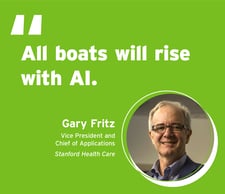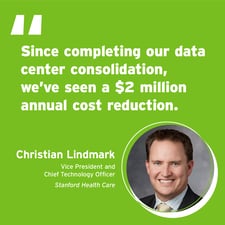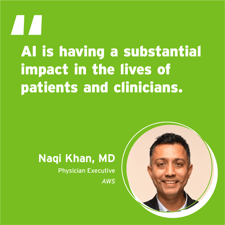Healthcare leaders are migrating their data, applications, and platforms to the cloud to boost quality, efficiency, and innovation within their organizations. At Arab Health 2024, Kevin Erdal, Managing Director and Global Practice Leader, Digital Health, Nordic, moderated a discussion on the benefits and challenges of cloud deployment and the technology’s impact as a driver of artificial intelligence. The panel featured Amazon Web Services (AWS) Physician Executive Naqi Khan, MD, and Stanford Health Care’s Christian Lindmark, Vice President and Chief Technology Officer, and Gary Fritz, Vice President and Chief of Applications. (Watch the full video below.)
Here are nine highlights from their conversation.

1. Fritz on the clinical and financial advantages of cloud and AI in healthcare: “All the applications in our portfolio will ultimately have an AI model. It’s inevitable. Predictive models can help inform physicians and reduce their cognitive burden, which is transformative for wellness and quality of care. There are also a lot of opportunities for real savings in the revenue cycle when AI models are applied in the right place. All boats will rise with AI.”

2. Lindmark on the success and bright future of cloud at Stanford Health Care: “Our private cloud has the same tools and capabilities as most hyperscalers. We’re able to spin environments up and down. We have consolidated tech stacks and automated functions. Since completing our data center consolidation in 2022, we’ve seen a $2 million annual cost reduction and decreased the number of priority 1/severity 1 incidents by 50%. Today, we’re 40% in the cloud. I firmly believe by 2030, 90% of our environment will be in the cloud.”
3. Kahn on AI sustainability: “There are a lot of opportunities moving forward as more and more AI models come into the cloud. At the same time, if you throw millions of these models out there it’s going to be confusing for the user. Aggregation and accumulation are what we’re seeing happen right now.”
4. Lindmark on the importance of industrywide collaboration to advance health IT modernization: “As providers, we’re all working on the same problem, but we often don’t do a good enough job of sharing what’s working well and what’s not working. We’re going to fail along the way, and we need to share that information with the broader community, so we don’t repeat the same mistakes. We’re better together.”
5. Fritz on cloud cybersecurity: “There is a case to be made that cloud can be safer because you can put a modern security envelope around your infrastructure. If you can get into the cloud environment with the right kind of monitoring, you can make it cost effective and, ultimately, safer. Also, it’s worth remembering cybersecurity doesn’t stop with the applications you own. It also extends to the applications every supplier that helps you owns. I’m always look at the supply chain to find out if the places where we’re buying our medications or supplies has equally robust security protections.”
6. Fritz on developing AI governance: “The issue is putting up the right guardrails to be responsible. The Coalition for Health AI is coming up with foundational models and a responsible AI development and management lifecycle that will provide industry guidance. There is serious discussion with cloud vendors and the federal government around building a small number of national labs that will allow AI developers and vendors to put their models into the environment to get tested against standardized data sets that are as free from bias as you can possibly get.”
7. Lindmark on establishing organizational buy-in: “During a cloud deployment, it’s critical to have buy-in throughout the organization. No one wants to feel like IT is doing something to them. People want to be brought along, have a hand in the decision-making process, and be a partner with IT. Moving something to the cloud for the sake of moving to the cloud isn’t worth the risk. You must show the rewards from a cost-savings perspective and how it’s going to reduce burdens and workloads. IT is one of the few organizations within a hospital that works with every other department. We have a unique advantage and view into the organization and a responsibility to work with each department to deploy platforms that help solve their challenges.”

8. Kahn on why he’s excited about generative AI in healthcare: “We’re seeing how AI is having a substantial impact in the lives of patients and clinicians. Whether its clinicians spending less time in front of their EHR system and not having to continuing working when they get home or patients getting access to tools in their language and at their education level.”
9. Lindmark on the value of strategic partnerships: “Make sure you have good strategic partnerships. Whether it's companies like Nordic or AWS, rely on your partners and build strategic relationships that can help you achieve your goals.”
Want more information on preparing for the cloud-powered future of healthcare? Read our e-book to explore how health IT modernization through the cloud can profoundly impact patient engagement, financial sustainability, operational integrity, and new digital frontiers like AI.